新概念英语第二册Lesson15 good news课件 (共47张PPT)
文档属性
| 名称 | 新概念英语第二册Lesson15 good news课件 (共47张PPT) | 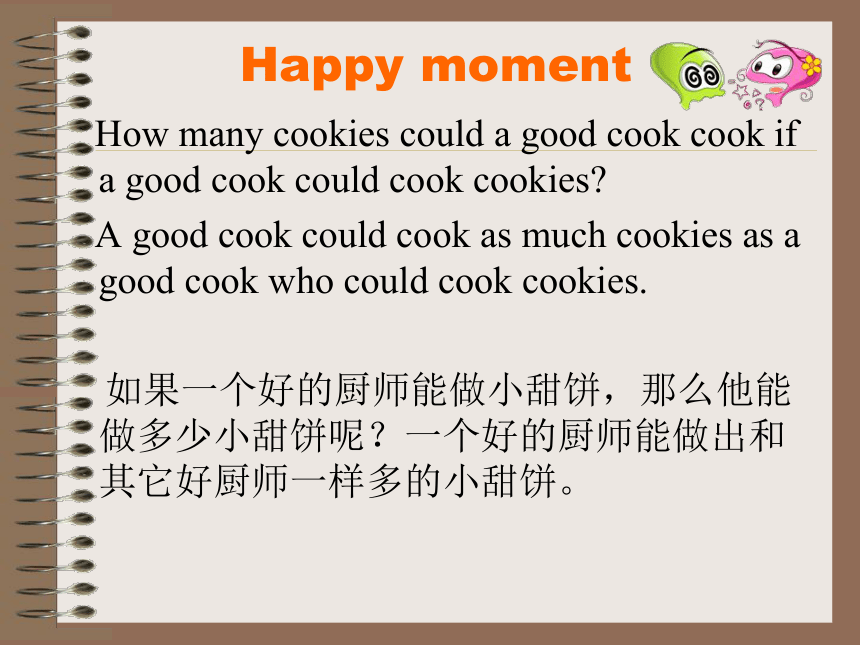 | |
| 格式 | ppt | ||
| 文件大小 | 3.3MB | ||
| 资源类型 | 教案 | ||
| 版本资源 | 新概念英语 | ||
| 科目 | 英语 | ||
| 更新时间 | 2023-10-06 07:20:01 | ||
图片预览

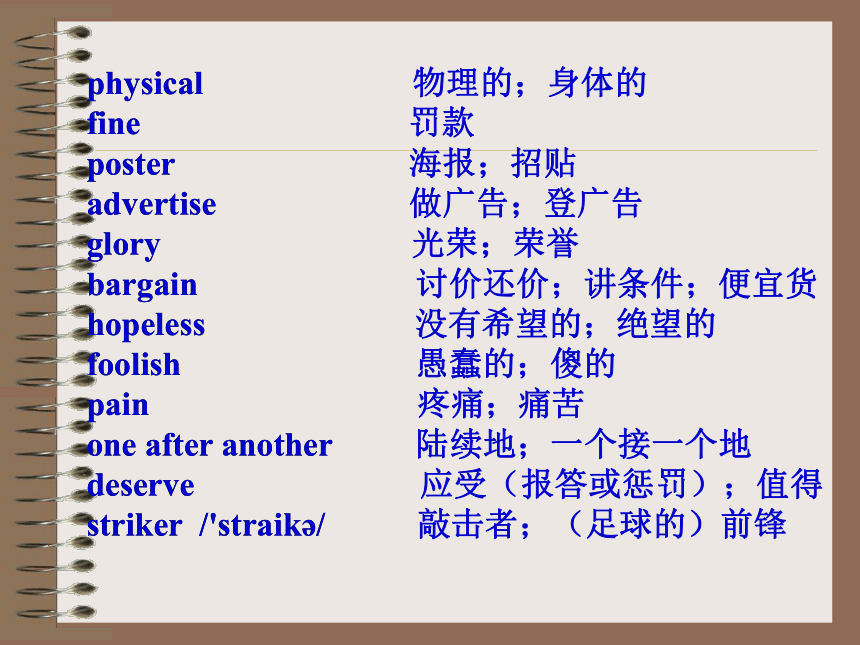
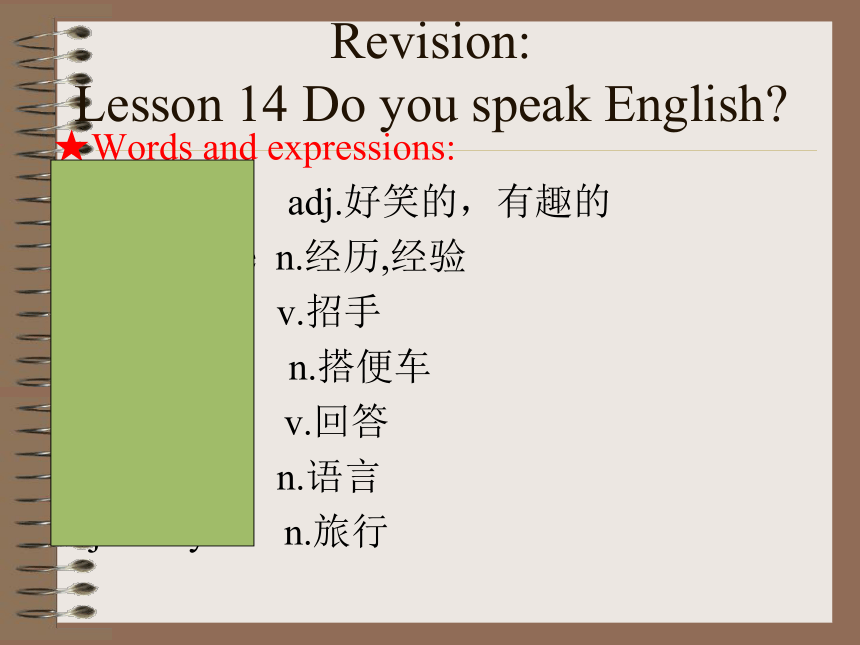
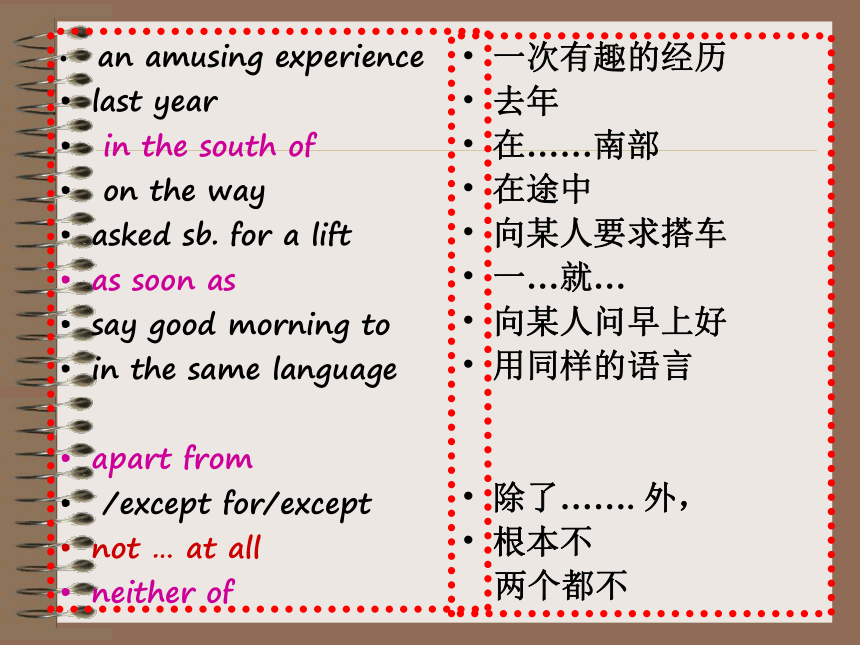
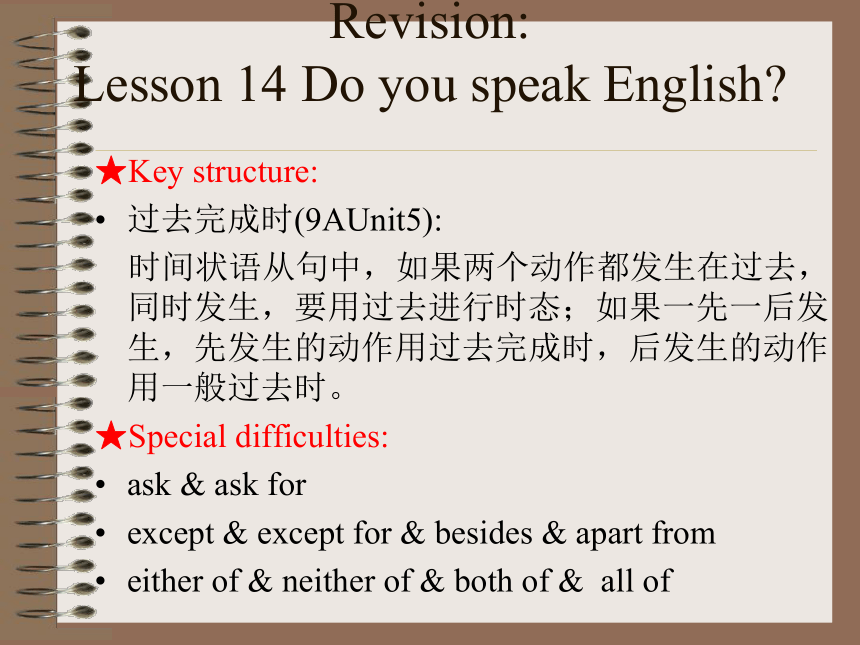
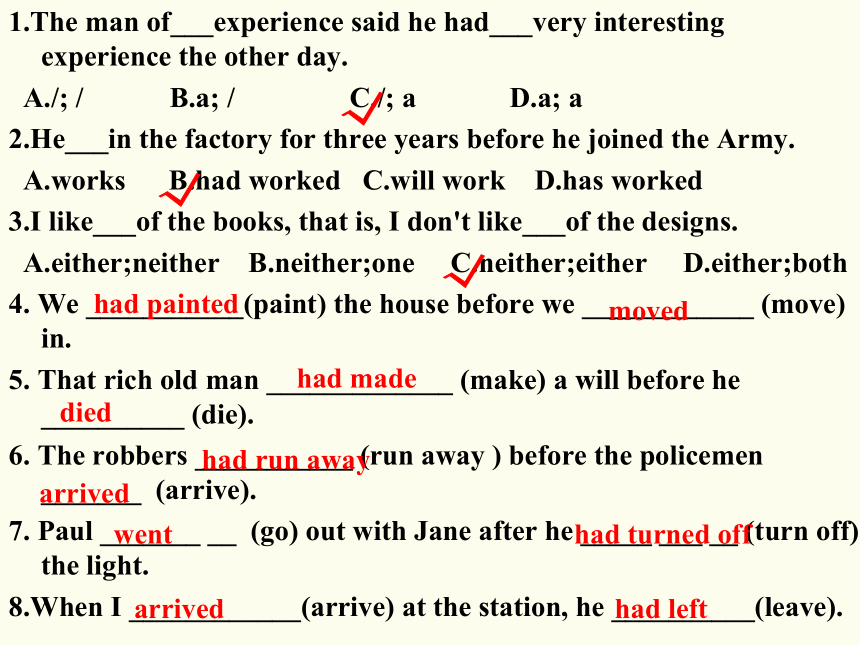

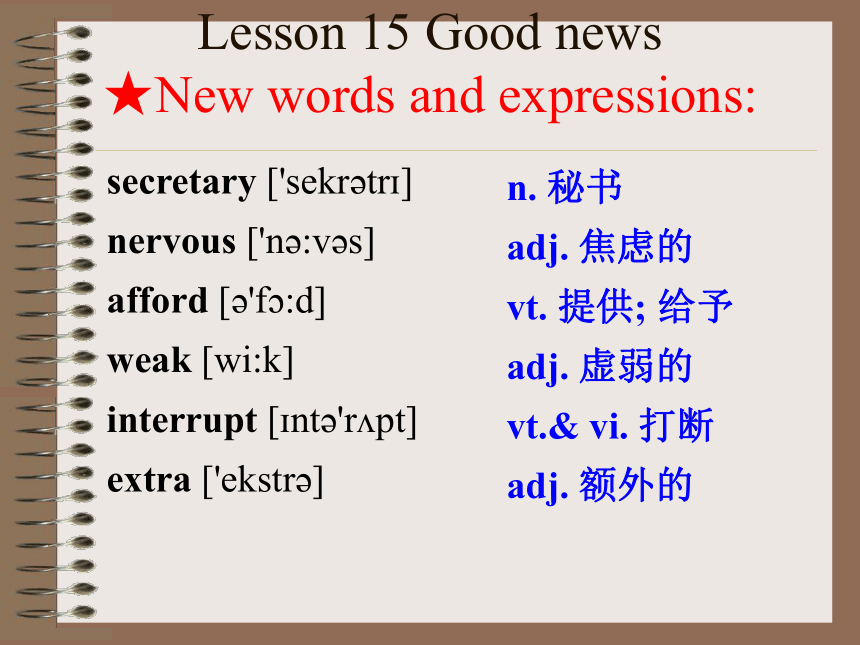
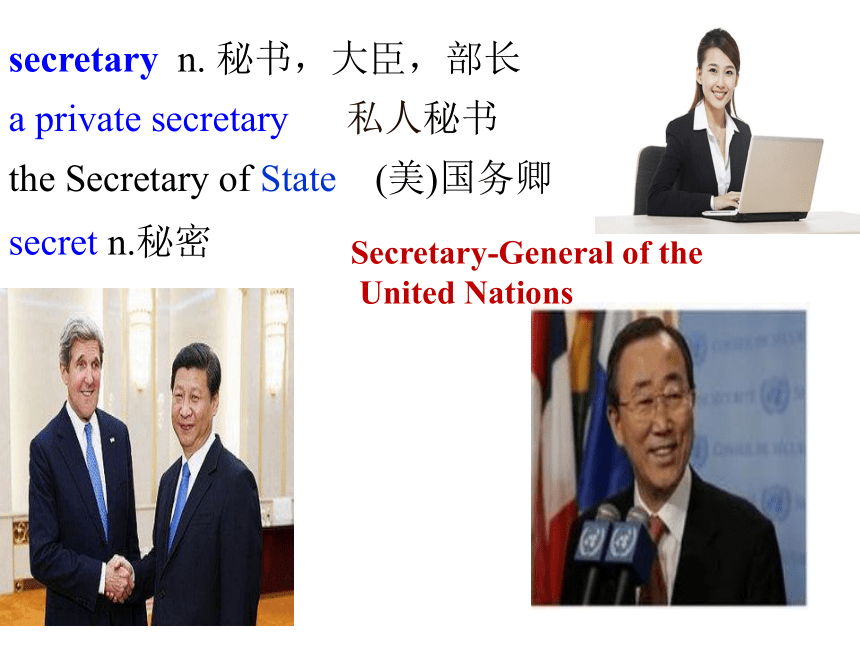
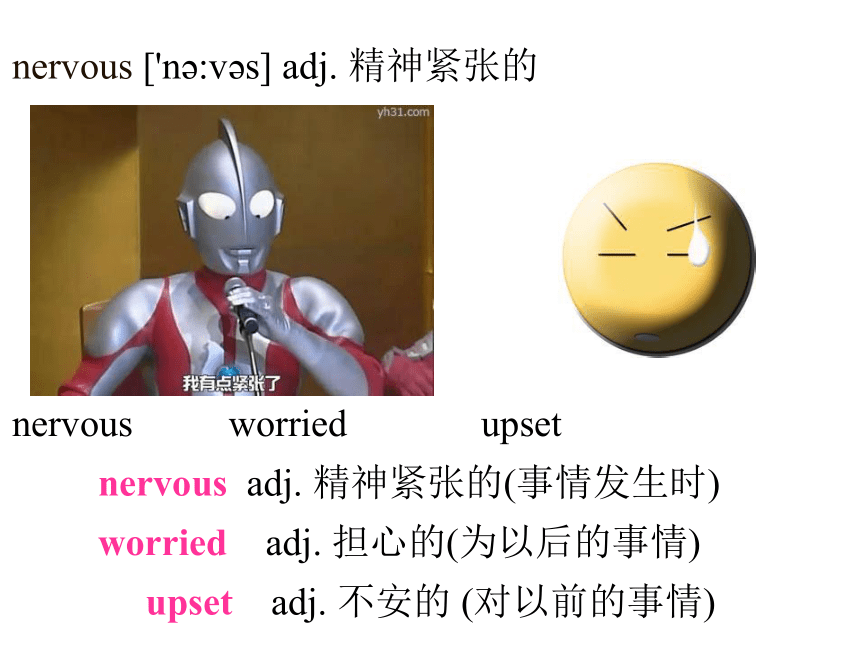
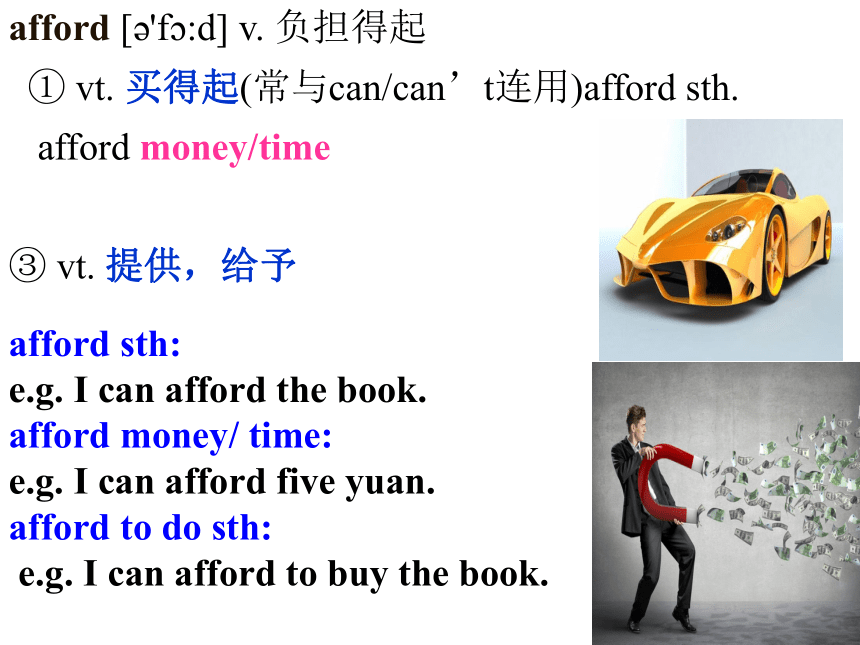
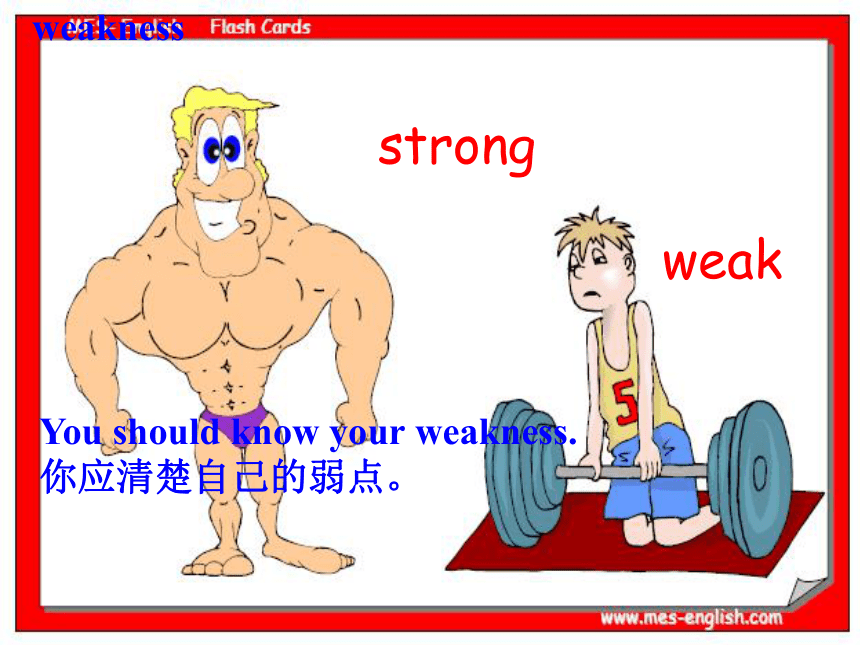
文档简介
(共47张PPT)
Happy moment
How many cookies could a good cook cook if a good cook could cook cookies
A good cook could cook as much cookies as a good cook who could cook cookies.
如果一个好的厨师能做小甜饼,那么他能做多少小甜饼呢?一个好的厨师能做出和其它好厨师一样多的小甜饼。
physical
fine
poster
advertise
glory
bargain
hopeless
foolish
pain
one after another
deserve
striker /'straik /
physical 物理的;身体的
fine 罚款
poster 海报;招贴
advertise 做广告;登广告
glory 光荣;荣誉
bargain 讨价还价;讲条件;便宜货
hopeless 没有希望的;绝望的
foolish 愚蠢的;傻的
pain 疼痛;痛苦
one after another 陆续地;一个接一个地
deserve 应受(报答或惩罚);值得
striker /'straik / 敲击者;(足球的)前锋
Revision:
Lesson 14 Do you speak English
★Words and expressions:
☆amusing adj.好笑的,有趣的
☆experience n.经历,经验
☆wave v.招手
☆lift n.搭便车
☆reply v.回答
☆language n.语言
☆journey n.旅行
an amusing experience
last year
in the south of
on the way
asked sb. for a lift
as soon as
say good morning to
in the same language
apart from
/except for/except
not … at all
neither of
一次有趣的经历
去年
在……南部
在途中
向某人要求搭车
一…就…
向某人问早上好
用同样的语言
除了…….外,
根本不
两个都不
Revision:
Lesson 14 Do you speak English
★Key structure:
过去完成时(9AUnit5):
时间状语从句中,如果两个动作都发生在过去,同时发生,要用过去进行时态;如果一先一后发生,先发生的动作用过去完成时,后发生的动作用一般过去时。
★Special difficulties:
ask & ask for
except & except for & besides & apart from
either of & neither of & both of & all of
1.The man of___experience said he had___very interesting experience the other day.
A./; / B.a; / C./; a D.a; a
2.He___in the factory for three years before he joined the Army.
A.works B.had worked C.will work D.has worked
3.I like___of the books, that is, I don't like___of the designs.
A.either;neither B.neither;one C.neither;either D.either;both
4. We ___________(paint) the house before we ____________ (move) in.
5. That rich old man _____________ (make) a will before he __________ (die).
6. The robbers ___________ (run away ) before the policemen _______ (arrive).
7. Paul _______ __ (go) out with Jane after he _____ ___ __ (turn off) the light.
8.When I ____________(arrive) at the station, he __________(leave).
had painted
moved
had made
died
had run away
arrived
went
had turned off
arrived
had left
Lesson 15 Good news
★New words and expressions:
secretary ['sekr tr ]
nervous ['n :v s]
afford [ 'f :d]
weak [wi:k]
interrupt [ nt 'r pt]
extra ['ekstr ]
n. 秘书
adj. 焦虑的
vt. 提供; 给予
adj. 虚弱的
vt.& vi. 打断
adj. 额外的
secretary n. 秘书,大臣,部长
a private secretary 私人秘书
the Secretary of State (美)国务卿
secret n.秘密
Secretary-General of the
United Nations
nervous ['n :v s] adj. 精神紧张的
nervous worried upset
nervous adj. 精神紧张的(事情发生时)
worried adj. 担心的(为以后的事情)
upset adj. 不安的 (对以前的事情)
afford [ 'f :d] v. 负担得起
① vt. 买得起(常与can/can’t连用)afford sth.
afford money/time
③ vt. 提供,给予
afford sth:
e.g. I can afford the book.
afford money/ time:
e.g. I can afford five yuan.
afford to do sth:
e.g. I can afford to buy the book.
weak [wi:k] adj. 1.虚弱的,2.不结实的
She was weak after her illness.
她病后很虚弱
a weak building
a weak smile
weak sunlight
一座不牢固的建筑
一个淡淡的微笑
微弱的阳光
strong
weak
weakness
You should know your weakness.
你应清楚自己的弱点。
extra ['ekstr ] adj. 额外的
extra time 加时赛
extra work 额外工作
eg. I think they didn’t want any extra help.
我想他们不需要额外帮助。
extra pay for extra work
额外工作的额外报酬
interrupt [ nt 'r pt] v. 1.中断,
2.打岔,插嘴
stop sb. speaking, break in/ cut in
汉译英:别打断我
Don’t interrupt me.
eg. Traffic in the city was interrupted by a
snowstorm.
市内交通被暴风雪所阻断。
It is rude to interrupt.
打断别人的话是不礼貌的。
disturb sb:打扰某人
interrupt sb:打断某人的话
New words and expressions
secretary ['sekr tr ]
nervous ['n :v s]
afford [ 'f :d]
weak [wi:k]
interrupt [ nt 'r pt]
extra ['ekstr ]
n. 秘书
adj. 焦虑的
vt. 提供; 给予
adj. 虚弱的
vt.& vi. 打断
adj. 额外的
New words and expressions
secretary ['sekr tr ]
nervous ['n :v s]
afford [ 'f :d]
weak [wi:k]
interrupt [ nt 'r pt]
extra ['ekstr ]
n. 秘书
adj. 焦虑的
vt. 提供; 给予
adj. 虚弱的
vt.& vi. 打断
adj. 额外的
They’re/look tired
What do they look
What do the animals look
1.Who is Mr. Harmsworth
2.How does the writer feel today
3.What did Mr. Harmsworth say about the business
The secretary told me that Mr. Harmsworth
would see me. I felt very nervous when I went into his office. He did not look up from his desk when I entered. After I had sat down, he said business was very bad. He told me that the firm could not afford to pay such large salaries.Twenty people had already left. I knew that my turn had come.
“Mr. Harmsworth,” I said in a weak voice.
“Don’t interrupt,” he said.
Then he smiled and told me I would receive
extra thousand pounds a year!
1 Who is Mr. Harmsworth
2.How does the writer feel today
3.What did Mr. Harmsworth say about the business
He told me that the firm could not afford to pay such large salaries.Twenty people had already left.
What do you think of the writer
Text
The secretary told me that Mr. Harmsworth would see me.
I felt very nervous when I went into his office.
He did not look up from his desk when I entered.
After I had sat down, he said that business was very bad.
He told me that the firm could not afford to pay such large salaries.
Twenty people had already left.
I knew that my turn had come.
'Mr. Harmsworth,' I said in a weak voice.
'Don't interrupt,' he said.
Then he smiled and told me I would receive an extra thousand pounds a year!
pay salaries:支付薪水
collect salary:领薪水
sb+spend time/money in doing/on sth
it/doing+takes/took sb time to do
Sth costs( cost)+money
Sb+pay(paid) money
秘书告诉我说哈姆斯沃斯先生要见我。我走进他的办公室,感到非常紧张。我进去的时 候,他连头也没抬。待我坐下后,他说生意非常不景气。他还告诉我,公司支付不起这么庞 大的工资开支,有20个人已经离去。我知道这次该轮到我了。
“哈姆斯沃斯先生,”我无力地说。
“不要打断我的话,”他说。
然后他微笑了一下告诉我说,我每年将得到1, 000英镑的额外收入。
1.feel / felt / felt nervous
Smell/look/sound/feel/taste+adj.
2.look up from his desk / look the new words up in the dictionary
look down 往地上看 look down upon/on sb. 瞧不起某人
look at /for /after/through/out (of)
3.enter /enter for
4.Business on business 在出差
5.can’t afford to do sth. P. 69
6.pay such large salaries
7.salary / wage
8.my turn / It’s one’s turn to do sth. / take turns /
in turns (依次轮流) / turn left /
take the first turning on the right
9.say in a weak voice
10an extra sum of one thousand pounds
He told me that the firm could not afford to pay such large salaries.
他告诉我,公司支付不起这么庞大的工资开支。
so+adj.或adv
so+形容词+a或an+单数可数名词
such+a/an+adj.+n.
a/an+such+adj.+n.
such+adj.+n.
1.He has such a beautiful bike. We all go to see it.
2.It's a such fine day. We al want to go to fly a kite.
3.The tiger is so big. And the cat is so small.
4.She is so lovely a girl.
Such/so
Such+a/an+adj+可数名词的单数形式/不可数名单
Such+adi+可数名词的复数形式
So+adj. /adv. a/an+可数名词的单数形式/不可数名单
So+adj. /adv. +可数名词的复数形式
He is _____ a good boy.
He has_____ many books.
He is _____a little boy.
He runs_____ quickly.
Such
so
such
so
The ________ told me that Mr. Harmsworth _____ see me. I felt very _______when I _____ into his office. He did not look up _____ his desk when I ______. After I had sat down, he said that ________ was very bad. He told me that the firm _____ not afford to pay _____ large salaries. ______ people had already left. I knew that _____ turn had come.
I said _____ a weak voice: “ Mr. Harmsworth.” But he told me not to _________ him. Then he _____ and told me I would ______ an extra thousand pounds _____ year!
secretary
would
nervous
went
from
entered
business
could
such
Twenty
my
in
interrupt
smiled
receive
a
回答下列问题,将答案组成一个段落,不要超过55个单词。
Who wanted to see you
How did you feel about this
Where did you go
Did he say that business was bad, or did he say that it was good
Could the firm pay such large salaries or not
How many people had left already
Did he ask you to leave as well or not
What did he offer you
Summary writing
Mr. Harmsworth wanted to see me. I felt very nervous about this. I went into his office. He said business was bad. The firm could not pay such large salaries. Twenty people had left already. He did not ask me to leave as well. He offered me an extra £1,000 a year. (53 words)
1.He said that business was very bad.
2.He told me that the firm could not
afford to pay such large salaries.
3.He said: “ Don’t interrupt.”
4. He smiled and told me I would receive
an extra thousand pounds a year!
直接引语和间接引语
Direct Speech and Indirect Speech
直接引述别人的话,叫“直接引语”;
用自己的话转述别人的话叫“间接引语”;
直接引语一般前后要加引号;
间接引语不用引号。
如: John said, “I like reading very much.”(直接引语)
John said that he liked reading very much.(间接引语)
1.He said that business was very bad.
He said “ Business is very bad.”
2.He told me that the firm could not
afford to pay such large salaries.
He says to me “ The firm can not afford
to pay such large salaries.”
3.He said“ Don’t interrupt.”
He told me not to interrupt him.
4. He smiled and told me I would receive
an extra thousand pounds a year!
He smiled and said to me “ You will
receive an extra thousand pounds a year!”
Mr. Chen says that he will never give up!
I will never give up!
Mr chen says
Let’s practice
The Object Clause 宾语从句
feel
The baby
The baby feels that English is very important!
“English is very important.”
I am the greatest man!
Mr. Bush
Mr. Bush hopes that he is the greatest man.
hope
Coofy
I won the first place!
Coofy tells Bens that he won the first place!
Bens
tell
Leo
I will be the first!
Leo thinks that he will be the first!
think
The Object Clause 宾语从句
Leo thought that he would be the first.
I am doing morning exercise.
know
Little Tommy
Little Tommy knows that he is doing morning exercise.
Little Tommy knew that he was doing morning exercise.
Mr. Chen says that he will never give up.
Little Tommy knows that he is doing morning exercise.
The baby feels that English is very important.
Mr. Bush hopes that he is the greatest man.
Leo thinks that he will be the first.
Coofy tells Bens that he won the first place.
间接引语
The Object Clause 宾语从句
Leo thinks that he will be the first.
引导词
(4种情况)
= Leo thinks he will be the first.
that 可以省略
主句
从句
结构:
+
+
The Object Clause 宾语从句
1.that
2.whether/if
3.连接代词
who whom whose what which
4. 连接副词when why where how。
1. 如果引语的引述动词是现在时,将来时或现在完成时,我们一般要用说话者原话中所用的语态.
“Will I be in time ” she wants to know.
= She wants to know if she will be in time.
I’ve already said, “I don’t know want to go.”
= I’ve already told you that I don’t want to go.
句中wants 和said 是引述词.
2. 如果引述动词是过去时, 引语应该作相应的变化.
a) 一般现在时改为一般过去时:
“I never work on Sundays,” she said.
= She said that she never worked on Sundays.
b) 现在进行时改为过去进行时:
“It isn’t raining,” she told me.
= She told me that it wasn’t raining.
c) 一般将来时改为过去将来时:
“ I’ll tell you a very funny story,” she said.
= She told me that she would tell me a very
funny story.
d) 现在完成时改为过去完成时:
“I have just heard the news,” he said.
= he said that he had just heard the news.
e) 一般过去时改为过去完成时:
“I broke the window,” Tom said.
= Tom said that he had broken the window.
直接引语改为间接引语时, 人称代词和物主形容词应该作适当的变化。地点和时间状语也应作相应改变。
直接引语------间接引语
now ----- then this ---- that
these---- those here ---- there
ago ----- before my ----- his/her
tomorrow ---- the following day
---- the next day
1.Lucy says, “Kate has a cat.”
2.Tom said, “My mother is cooking.”
3.Mike says, “Our teacher likes fish.”
4.Lily said, “We will go to school by car.”
5.Sam says, “ I want to see Mr Green.”
Lucy says that Kate has a cat.
Tom said that his mother was cooking.
Mike says that their teacher likes fish.
Lily says that they would go to school by car.
Sam says that he wants to see Mr Green.
将下列各句合并为含有宾语从句的复合句
He isn’t very good at travelling. He says…
You’ll have a good holiday. I hope…
She has been to Beijing twice . Kate said…
He is doing his homework. I’m sure …
Miss Gao has a big smile . You can see from this photo…
6. I made a mistake . I’m sorry …
Happy moment
How many cookies could a good cook cook if a good cook could cook cookies
A good cook could cook as much cookies as a good cook who could cook cookies.
如果一个好的厨师能做小甜饼,那么他能做多少小甜饼呢?一个好的厨师能做出和其它好厨师一样多的小甜饼。
physical
fine
poster
advertise
glory
bargain
hopeless
foolish
pain
one after another
deserve
striker /'straik /
physical 物理的;身体的
fine 罚款
poster 海报;招贴
advertise 做广告;登广告
glory 光荣;荣誉
bargain 讨价还价;讲条件;便宜货
hopeless 没有希望的;绝望的
foolish 愚蠢的;傻的
pain 疼痛;痛苦
one after another 陆续地;一个接一个地
deserve 应受(报答或惩罚);值得
striker /'straik / 敲击者;(足球的)前锋
Revision:
Lesson 14 Do you speak English
★Words and expressions:
☆amusing adj.好笑的,有趣的
☆experience n.经历,经验
☆wave v.招手
☆lift n.搭便车
☆reply v.回答
☆language n.语言
☆journey n.旅行
an amusing experience
last year
in the south of
on the way
asked sb. for a lift
as soon as
say good morning to
in the same language
apart from
/except for/except
not … at all
neither of
一次有趣的经历
去年
在……南部
在途中
向某人要求搭车
一…就…
向某人问早上好
用同样的语言
除了…….外,
根本不
两个都不
Revision:
Lesson 14 Do you speak English
★Key structure:
过去完成时(9AUnit5):
时间状语从句中,如果两个动作都发生在过去,同时发生,要用过去进行时态;如果一先一后发生,先发生的动作用过去完成时,后发生的动作用一般过去时。
★Special difficulties:
ask & ask for
except & except for & besides & apart from
either of & neither of & both of & all of
1.The man of___experience said he had___very interesting experience the other day.
A./; / B.a; / C./; a D.a; a
2.He___in the factory for three years before he joined the Army.
A.works B.had worked C.will work D.has worked
3.I like___of the books, that is, I don't like___of the designs.
A.either;neither B.neither;one C.neither;either D.either;both
4. We ___________(paint) the house before we ____________ (move) in.
5. That rich old man _____________ (make) a will before he __________ (die).
6. The robbers ___________ (run away ) before the policemen _______ (arrive).
7. Paul _______ __ (go) out with Jane after he _____ ___ __ (turn off) the light.
8.When I ____________(arrive) at the station, he __________(leave).
had painted
moved
had made
died
had run away
arrived
went
had turned off
arrived
had left
Lesson 15 Good news
★New words and expressions:
secretary ['sekr tr ]
nervous ['n :v s]
afford [ 'f :d]
weak [wi:k]
interrupt [ nt 'r pt]
extra ['ekstr ]
n. 秘书
adj. 焦虑的
vt. 提供; 给予
adj. 虚弱的
vt.& vi. 打断
adj. 额外的
secretary n. 秘书,大臣,部长
a private secretary 私人秘书
the Secretary of State (美)国务卿
secret n.秘密
Secretary-General of the
United Nations
nervous ['n :v s] adj. 精神紧张的
nervous worried upset
nervous adj. 精神紧张的(事情发生时)
worried adj. 担心的(为以后的事情)
upset adj. 不安的 (对以前的事情)
afford [ 'f :d] v. 负担得起
① vt. 买得起(常与can/can’t连用)afford sth.
afford money/time
③ vt. 提供,给予
afford sth:
e.g. I can afford the book.
afford money/ time:
e.g. I can afford five yuan.
afford to do sth:
e.g. I can afford to buy the book.
weak [wi:k] adj. 1.虚弱的,2.不结实的
She was weak after her illness.
她病后很虚弱
a weak building
a weak smile
weak sunlight
一座不牢固的建筑
一个淡淡的微笑
微弱的阳光
strong
weak
weakness
You should know your weakness.
你应清楚自己的弱点。
extra ['ekstr ] adj. 额外的
extra time 加时赛
extra work 额外工作
eg. I think they didn’t want any extra help.
我想他们不需要额外帮助。
extra pay for extra work
额外工作的额外报酬
interrupt [ nt 'r pt] v. 1.中断,
2.打岔,插嘴
stop sb. speaking, break in/ cut in
汉译英:别打断我
Don’t interrupt me.
eg. Traffic in the city was interrupted by a
snowstorm.
市内交通被暴风雪所阻断。
It is rude to interrupt.
打断别人的话是不礼貌的。
disturb sb:打扰某人
interrupt sb:打断某人的话
New words and expressions
secretary ['sekr tr ]
nervous ['n :v s]
afford [ 'f :d]
weak [wi:k]
interrupt [ nt 'r pt]
extra ['ekstr ]
n. 秘书
adj. 焦虑的
vt. 提供; 给予
adj. 虚弱的
vt.& vi. 打断
adj. 额外的
New words and expressions
secretary ['sekr tr ]
nervous ['n :v s]
afford [ 'f :d]
weak [wi:k]
interrupt [ nt 'r pt]
extra ['ekstr ]
n. 秘书
adj. 焦虑的
vt. 提供; 给予
adj. 虚弱的
vt.& vi. 打断
adj. 额外的
They’re/look tired
What do they look
What do the animals look
1.Who is Mr. Harmsworth
2.How does the writer feel today
3.What did Mr. Harmsworth say about the business
The secretary told me that Mr. Harmsworth
would see me. I felt very nervous when I went into his office. He did not look up from his desk when I entered. After I had sat down, he said business was very bad. He told me that the firm could not afford to pay such large salaries.Twenty people had already left. I knew that my turn had come.
“Mr. Harmsworth,” I said in a weak voice.
“Don’t interrupt,” he said.
Then he smiled and told me I would receive
extra thousand pounds a year!
1 Who is Mr. Harmsworth
2.How does the writer feel today
3.What did Mr. Harmsworth say about the business
He told me that the firm could not afford to pay such large salaries.Twenty people had already left.
What do you think of the writer
Text
The secretary told me that Mr. Harmsworth would see me.
I felt very nervous when I went into his office.
He did not look up from his desk when I entered.
After I had sat down, he said that business was very bad.
He told me that the firm could not afford to pay such large salaries.
Twenty people had already left.
I knew that my turn had come.
'Mr. Harmsworth,' I said in a weak voice.
'Don't interrupt,' he said.
Then he smiled and told me I would receive an extra thousand pounds a year!
pay salaries:支付薪水
collect salary:领薪水
sb+spend time/money in doing/on sth
it/doing+takes/took sb time to do
Sth costs( cost)+money
Sb+pay(paid) money
秘书告诉我说哈姆斯沃斯先生要见我。我走进他的办公室,感到非常紧张。我进去的时 候,他连头也没抬。待我坐下后,他说生意非常不景气。他还告诉我,公司支付不起这么庞 大的工资开支,有20个人已经离去。我知道这次该轮到我了。
“哈姆斯沃斯先生,”我无力地说。
“不要打断我的话,”他说。
然后他微笑了一下告诉我说,我每年将得到1, 000英镑的额外收入。
1.feel / felt / felt nervous
Smell/look/sound/feel/taste+adj.
2.look up from his desk / look the new words up in the dictionary
look down 往地上看 look down upon/on sb. 瞧不起某人
look at /for /after/through/out (of)
3.enter /enter for
4.Business on business 在出差
5.can’t afford to do sth. P. 69
6.pay such large salaries
7.salary / wage
8.my turn / It’s one’s turn to do sth. / take turns /
in turns (依次轮流) / turn left /
take the first turning on the right
9.say in a weak voice
10an extra sum of one thousand pounds
He told me that the firm could not afford to pay such large salaries.
他告诉我,公司支付不起这么庞大的工资开支。
so+adj.或adv
so+形容词+a或an+单数可数名词
such+a/an+adj.+n.
a/an+such+adj.+n.
such+adj.+n.
1.He has such a beautiful bike. We all go to see it.
2.It's a such fine day. We al want to go to fly a kite.
3.The tiger is so big. And the cat is so small.
4.She is so lovely a girl.
Such/so
Such+a/an+adj+可数名词的单数形式/不可数名单
Such+adi+可数名词的复数形式
So+adj. /adv. a/an+可数名词的单数形式/不可数名单
So+adj. /adv. +可数名词的复数形式
He is _____ a good boy.
He has_____ many books.
He is _____a little boy.
He runs_____ quickly.
Such
so
such
so
The ________ told me that Mr. Harmsworth _____ see me. I felt very _______when I _____ into his office. He did not look up _____ his desk when I ______. After I had sat down, he said that ________ was very bad. He told me that the firm _____ not afford to pay _____ large salaries. ______ people had already left. I knew that _____ turn had come.
I said _____ a weak voice: “ Mr. Harmsworth.” But he told me not to _________ him. Then he _____ and told me I would ______ an extra thousand pounds _____ year!
secretary
would
nervous
went
from
entered
business
could
such
Twenty
my
in
interrupt
smiled
receive
a
回答下列问题,将答案组成一个段落,不要超过55个单词。
Who wanted to see you
How did you feel about this
Where did you go
Did he say that business was bad, or did he say that it was good
Could the firm pay such large salaries or not
How many people had left already
Did he ask you to leave as well or not
What did he offer you
Summary writing
Mr. Harmsworth wanted to see me. I felt very nervous about this. I went into his office. He said business was bad. The firm could not pay such large salaries. Twenty people had left already. He did not ask me to leave as well. He offered me an extra £1,000 a year. (53 words)
1.He said that business was very bad.
2.He told me that the firm could not
afford to pay such large salaries.
3.He said: “ Don’t interrupt.”
4. He smiled and told me I would receive
an extra thousand pounds a year!
直接引语和间接引语
Direct Speech and Indirect Speech
直接引述别人的话,叫“直接引语”;
用自己的话转述别人的话叫“间接引语”;
直接引语一般前后要加引号;
间接引语不用引号。
如: John said, “I like reading very much.”(直接引语)
John said that he liked reading very much.(间接引语)
1.He said that business was very bad.
He said “ Business is very bad.”
2.He told me that the firm could not
afford to pay such large salaries.
He says to me “ The firm can not afford
to pay such large salaries.”
3.He said“ Don’t interrupt.”
He told me not to interrupt him.
4. He smiled and told me I would receive
an extra thousand pounds a year!
He smiled and said to me “ You will
receive an extra thousand pounds a year!”
Mr. Chen says that he will never give up!
I will never give up!
Mr chen says
Let’s practice
The Object Clause 宾语从句
feel
The baby
The baby feels that English is very important!
“English is very important.”
I am the greatest man!
Mr. Bush
Mr. Bush hopes that he is the greatest man.
hope
Coofy
I won the first place!
Coofy tells Bens that he won the first place!
Bens
tell
Leo
I will be the first!
Leo thinks that he will be the first!
think
The Object Clause 宾语从句
Leo thought that he would be the first.
I am doing morning exercise.
know
Little Tommy
Little Tommy knows that he is doing morning exercise.
Little Tommy knew that he was doing morning exercise.
Mr. Chen says that he will never give up.
Little Tommy knows that he is doing morning exercise.
The baby feels that English is very important.
Mr. Bush hopes that he is the greatest man.
Leo thinks that he will be the first.
Coofy tells Bens that he won the first place.
间接引语
The Object Clause 宾语从句
Leo thinks that he will be the first.
引导词
(4种情况)
= Leo thinks he will be the first.
that 可以省略
主句
从句
结构:
+
+
The Object Clause 宾语从句
1.that
2.whether/if
3.连接代词
who whom whose what which
4. 连接副词when why where how。
1. 如果引语的引述动词是现在时,将来时或现在完成时,我们一般要用说话者原话中所用的语态.
“Will I be in time ” she wants to know.
= She wants to know if she will be in time.
I’ve already said, “I don’t know want to go.”
= I’ve already told you that I don’t want to go.
句中wants 和said 是引述词.
2. 如果引述动词是过去时, 引语应该作相应的变化.
a) 一般现在时改为一般过去时:
“I never work on Sundays,” she said.
= She said that she never worked on Sundays.
b) 现在进行时改为过去进行时:
“It isn’t raining,” she told me.
= She told me that it wasn’t raining.
c) 一般将来时改为过去将来时:
“ I’ll tell you a very funny story,” she said.
= She told me that she would tell me a very
funny story.
d) 现在完成时改为过去完成时:
“I have just heard the news,” he said.
= he said that he had just heard the news.
e) 一般过去时改为过去完成时:
“I broke the window,” Tom said.
= Tom said that he had broken the window.
直接引语改为间接引语时, 人称代词和物主形容词应该作适当的变化。地点和时间状语也应作相应改变。
直接引语------间接引语
now ----- then this ---- that
these---- those here ---- there
ago ----- before my ----- his/her
tomorrow ---- the following day
---- the next day
1.Lucy says, “Kate has a cat.”
2.Tom said, “My mother is cooking.”
3.Mike says, “Our teacher likes fish.”
4.Lily said, “We will go to school by car.”
5.Sam says, “ I want to see Mr Green.”
Lucy says that Kate has a cat.
Tom said that his mother was cooking.
Mike says that their teacher likes fish.
Lily says that they would go to school by car.
Sam says that he wants to see Mr Green.
将下列各句合并为含有宾语从句的复合句
He isn’t very good at travelling. He says…
You’ll have a good holiday. I hope…
She has been to Beijing twice . Kate said…
He is doing his homework. I’m sure …
Miss Gao has a big smile . You can see from this photo…
6. I made a mistake . I’m sorry …
同课章节目录
